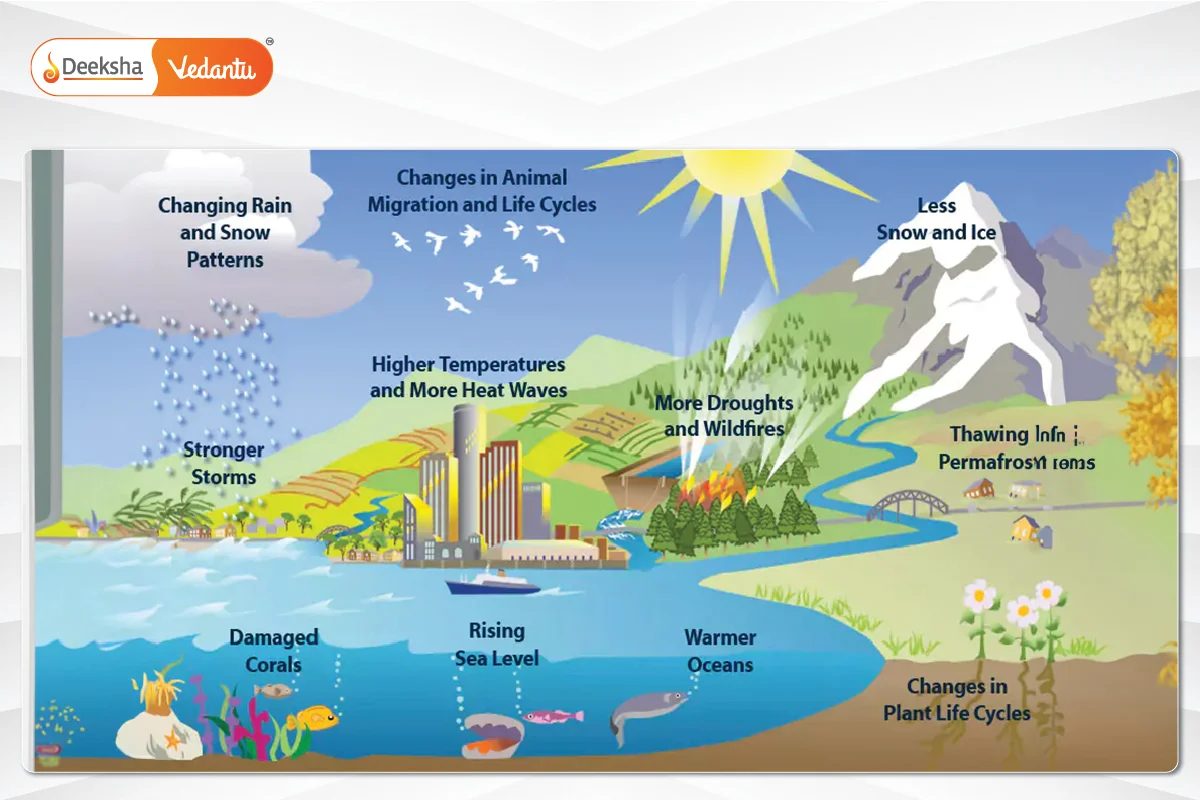Definition of Global Warming
Global warming is the gradual rise in Earth’s temperature, mainly caused by the greenhouse effect due to higher levels of carbon dioxide (CO2), CFCs, and other pollutants.
What is Global Warming?
Global warming refers to the slow increase in the Earth’s surface temperature over the last couple of centuries, affecting the climate. While some debate its significance, scientific data shows a continuous rise in Earth’s temperature.

Causes of Global Warming
Global warming has several causes, both human-made and natural, which negatively impact humans, plants, and animals. Understanding these causes is crucial to mitigating the effects.
Man-made Causes of Global Warming:
- Deforestation: Cutting down trees reduces oxygen levels and increases CO2, leading to an imbalance and higher temperatures.
- Vehicle Use: Burning fossil fuels in vehicles releases CO2 and toxins, raising temperatures.
- Chlorofluorocarbons (CFCs): Excessive use of air conditioners and refrigerators releases CFCs, depleting the ozone layer and allowing more UV rays to reach Earth, increasing temperatures.
- Industrial Development: Factory emissions contribute significantly to rising temperatures.
- Agriculture: Farming activities produce greenhouse gases like CO2 and methane, adding to global warming.
- Overpopulation: More people means more CO2 from breathing, contributing to global warming.
Natural Causes of Global Warming:
- Volcanoes: Eruptions release ash and smoke, affecting the climate.
- Water Vapour: As temperatures rise, more water evaporates, increasing atmospheric water vapour, a greenhouse gas.
- Melting Permafrost: Thawing permafrost releases trapped gases, increasing Earth’s temperature.
- Forest Fires: These release large amounts of carbon-containing smoke, contributing to global warming.
Effects of Global Warming:
- Rise in Temperature: Earth’s temperature has risen by ~1 degree since 1880, melting glaciers and rising sea levels, affecting coastal areas.
- Threats to Ecosystems: Coral reefs and other ecosystems suffer, leading to loss of plant and animal life.
- Climate Change: Results in unpredictable weather patterns, such as droughts and floods.
- Spread of Diseases: Changes in heat and humidity affect disease-carrying organisms like mosquitoes.
- High Mortality Rates: Natural disasters and disease outbreaks due to climate change increase death rates.
- Loss of Natural Habitat: Changing climates force animals to migrate or face extinction, impacting biodiversity.
Understanding the causes and effects of global warming is essential to address and mitigate its impacts on our planet.
FAQs
Global warming affects human health by changing heat and humidity patterns, increasing the spread of diseases, and causing more frequent natural disasters.
Natural causes include volcanic eruptions, water vapour, melting permafrost, and forest fires, which release greenhouse gases into the atmosphere.
Industrial activities release large amounts of CO2 and other greenhouse gases, contributing significantly to the increase in Earth’s temperature.
Vehicles burn fossil fuels, releasing CO2 and other pollutants into the atmosphere, which increases the greenhouse effect and raises Earth’s temperature.
Deforestation reduces the number of trees that absorb CO2 and release oxygen, leading to higher levels of CO2 in the atmosphere and increased global temperatures.
Man-made: Deforestation, vehicle emissions, industrial development, excessive use of CFCs, agriculture, and overpopulation.
Natural: Volcanic eruptions, water vapour, melting permafrost, and forest fires.
Global warming is the gradual increase in Earth’s temperature caused by the greenhouse effect from higher levels of CO2, CFCs, and other pollutants.






Get Social